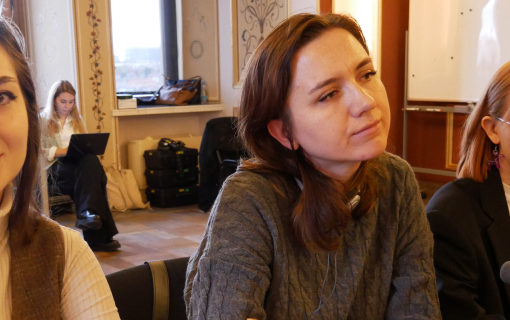IFES Participates in the 2014 A World of Women for World Peace Conference
On November 13, IFES Senior Gender Specialist Jessica Huber took to Capitol Hill to participate in Congresswoman Eddie Bernice Johnson’s (D-TX) “A World of Women for World Peace Conference,” a biannual event that seeks to bring greater visibility to women who promote peacemaking, peacekeeping and peace-building activities in their communities.
The theme of this year’s conference was “Women’s Political Participation,” and featured, as panelists, Jessica Huber, the International Foundation for Electoral Systems’ (IFES) Senior Gender Specialist; Cattie Lott, Deputy Director for the Center of Excellence on Democracy, Human Rights, and Governance, Bureau for Democracy, Conflict and Humanitarian Assistance at the U.S. Agency for International Development (USAID); Sandra Pepera, Director, Women’s Political Participation at the National Democratic Institute; Ida Sefer-Roche of the Bosnian-American Genocide Institute; and Karen Mulhauser, Chair of United Nations Association of the USA. The panel was moderated by Dr. Sarah Wagner, Associate Professor of Anthropology at George Washington University, and audience members included staffers from a variety of Capitol Hill offices, representatives from nonprofit advocacy groups and members of the general public.
Congresswoman Johnson – former chairwoman of the Congressional Black Caucus and founder and co-chair of the Diversity and Innovation Caucus – gave opening remarks that summarized the event’s dual purpose: to highlight the importance of gender equality in activism, politics and elections and to celebrate inspirational leaders who empower women across the globe. She concluded by personally thanking the panelists, and expressing enthusiasm on working with them to bolster women’s rights in the years ahead.
Huber first introduced IFES’ mission of supporting citizens’ right to participate in free and fair elections via technical electoral assistance, the inclusion of underrepresented populations in the political process, the engagement and education of voters on their political rights and responsibilities and the application of innovative, field-based research to improve the electoral cycle. She then stressed the crucial importance of inclusive institutions and fully informed and engaged voters to stable democracies, and IFES’ corresponding programming to promote the political participation and civic education of women, persons with disabilities, youth, LGBT communities and underserved populations, including minorities, indigenous populations and the poor.
Huber then focused on the importance of promoting women’s political participation and leadership in civil society. For example, research indicates that societies in which women are politically empowered as leaders experience greater gains in education, infrastructure and health, and have citizen-responsive legislatures and a pro-democracy agendas. Additionally, women bring depth and perspective to both national and local policy debates, and are more likely to advocate on issues that will benefit a broader spectrum of stakeholders.
Furthermore, Huber discussed the unique barriers women face in participating in the political process, including: in times of transition from conflict and during peaceful democracy building, women are excluded from decision-making on national security and governance issues; a vast majority of resistance to the inclusion of women is rooted in cultural attitudes, necessitating long-term systematic solutions; there is a persistent threat and practice of violence against women participating in the political arena; and there is a lack of access to information and education.
Huber then shared IFES’ cutting-edge programming to address these issues: firstly, IFES works to integrate gender equality and women’s empowerment activities into its governance work with election management bodies (EMBs). Secondly, IFES has a robust portfolio of standalone gender programming, founded on innovative research (e.g., the global “Status of Women” public opinion surveys), tools and publications for EMBs, civil society, and other stakeholders on best practices for gender equality and women’s empowerment in electoral legal frameworks, negotiations, workforces, and emerging institutions of transitional societies.
In particular, Huber stressed IFES’ accomplishments in Libya, Côte d’Ivoire and Myanmar via USAID’s Global Women’s Leadership Fund. For example, she discussed how IFES’ research on gender issues can illuminate opportunities and challenges to the full participation of all citizens. The 2013 “Libya Status of Women Survey” demonstrated that while 71 percent of Libyan women were “very or somewhat” interested in matters of politics and governance, only 20 percent reported participating in politics in the past twelve months. This, along with significant participation gaps dependent on education levels and geographic variables, suggested new ways of targeting civic education and voter outreach.
During the question and answer session, panelists fielded questions on supporting the political participation of women post-conflict and women’s access to campaign finance.









